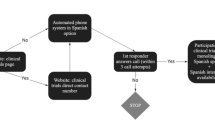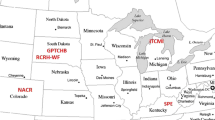Abstract
This community-based participatory research (CBPR) study was based on patient navigation (Navigator) among three original sites: Colorado, Michigan, and South Dakota. During 2010, the study added two sites: the Comanche Nation and the Muscogee (Creek) Nation (Oklahoma). The intervention includes 24-h of a Navigator-implemented cancer education program that addresses the full continuum of cancer care. The partners include agreements with up to two local Native American organizations each year, called Memorandum Native Organizations, who have strong relationships with local American Indians. Family fun events are used to initiate the series of workshops and to collect baseline data and also to wrap up and evaluate the series 3 months following the completion of the workshop series. Evaluation data are collected using an audience response system (ARS) and stored using an online evaluation program. Among the lessons learned to date are: the Institutional Review Board processes required both regional and national approvals and took more than 9 months. All of the workshop slides were missing some components and needed refinements. The specifics for the Memorandum Native Organization deliverables needed more details. The ARS required additional training sessions, but once learned the Navigator use the ARS well. Use of the NACR website for a password-protected page to store all NNACC workshop and training materials was easier to manage than use of other online storage programs. The community interest in taking part in the workshops was greater than what was anticipated. All of the Navigators’ skills are improving and all are enjoying working with the community.


Similar content being viewed by others
Abbreviations
- ARS:
-
Audience response system (collects demographic/evaluation data electronically)
- CBPR:
-
Community-based participatory research
- GPTCHB:
-
Great Plains Tribal Chairmen’s Health Board
- ITCMI:
-
Intertribal Council of Michigan, Incorporated
- NNACC:
-
Native Navigators and the Cancer Continuum
- NACR:
-
Native American Cancer Research Corporation
- RCRH:
-
Rapid City Regional Hospital
References
Burhansstipanov L, Bad Wound D, Capelouto N, Goldfarb F, Harjo L, Hatathlie L, Vigil G, White M (1998) Culturally relevant “navigator” patient support: the native sisters. Cancer Pract 6(3):191–194, PMID: 9652252
Burhansstipanov L, Dignan MB, Bad Wound D, Tenney M, Vigil G (2000) Native American recruitment into breast cancer screening: the NAWWA project. J Cancer Educ 15:29–33, PMID:10730800
Burhansstipanov L (1999) Native American community-based cancer projects: theory versus reality. Cancer Control: Journal of the Moffitt Cancer Center 6(6):620–626, PMID: 10756397
Dignan MB, Burhansstipanov L, Hariton J, Harjo L, Rattler T, Lee R, Mason M (2005) A comparison of two Native American Navigator formats: face-to-face and telephone. Cancer control: Journal of the Moffitt Cancer Center 28–33. Grant [NCI R25 CA77665] PMID: 16327748
Burhansstipanov L, Dignan MB, Schumacher A, Krebs LU, Alfonsi G, Apodaca C (2010) Breast screening navigator programs within three settings that assist underserved women. J Cancer Educ. PMID: 20300914
Burhansstipanov L, Krebs LU, Seals BF, Bradley AA, Kaur JS, Iron P, Dignan MB, Thiel C, Gamito E (2010) Native American breast cancer survivors’ physical conditions and quality of life. Cancer. PMID:20120031
Acknowledgments
This study was supported by the Native Navigators and the Cancer Continuum (NNACC) [PI: Burhansstipanov, R24MD002811] and the Native Navigation across the Cancer Continuum in Comanche Nation (NNACC-CN) [PI: Eschiti, R15 NR 012195]. The project described was supported by Award Number R15NR012195 from the National Institute of Nursing Research. The content is solely the responsibility of the authors and does not necessarily represent the official vies of the national Institute of Nursing Research or the National Institutes of Health. This study would not be possible without the dedication and efficiency of each sites’ patient navigators: Colorado/NACR (Lisa Harjo, MS, Choctaw Nation of Oklahoma; Audrey Marshall, Oneida; and Rose Lee, BS, Navajo Nation); Michigan/ITCMI (Amanda Leonard and Mark Ojeda-Vasquez); South Dakota/RCRH/GPTCHB (Tinka Duran and Kim Crawford); and Comanche Nation (Leslie Weryackwe and Stacy Weryackwe-Sanford LPN).
Western Institutional Review Board Protocol Number: 20081858
Conflict of Interest
The authors declare that they do not have a conflict of interest.
Author information
Authors and Affiliations
Corresponding author
Rights and permissions
About this article
Cite this article
Burhansstipanov, L., Krebs, L.U., Watanabe-Galloway, S. et al. Preliminary Lessons Learned from the “Native Navigators and the Cancer Continuum” (NNACC). J Canc Educ 27 (Suppl 1), 57–65 (2012). https://doi.org/10.1007/s13187-012-0316-5
Published:
Issue Date:
DOI: https://doi.org/10.1007/s13187-012-0316-5




